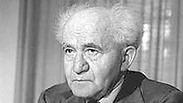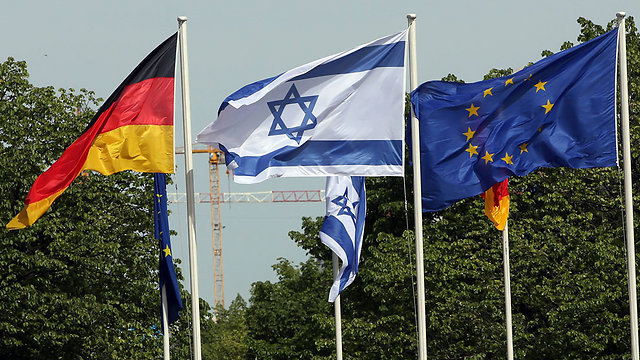
Ben-Gurion predicted that the Germans would establish a democracy free of Nazi insanity
באדיבות אתר הכנסת
Ben-Gurion was right to legitimize the 'other Germany'
Op-ed: The Jews' willingness to forgive the new German generation without forgetting the old generation's crimes became institutionalized only after the Germans had taken full responsibility and blame for the Holocaust in the past few decades.
In May 1966, the former chancellor of West Germany, Konrad Adenauer, a 91-year-old statesman, visited the Hebrew University in Jerusalem. Several dozen students went out to protest the visit; I was one of them.

In retrospect, it was an unnecessary show of protest, no longer at the right time. The most popular car in Israel at the time was Volkswagen, the most popular trip to Europe was going shopping in Cologne, and the Israeli media lamented the wave of young people looking for their fortune in divided Berlin.
The small number of protestors against Adenauer's visit only emphasized the Jewish Israeli public's acceptance – or should I say the joy – of the reconciliation with Germany, which reached its formal peak in the establishment of full diplomatic relations between the German Federal Republic and the State of Israel in May 1965.
The reconciliation process itself began at least a dozen years earlier, when the Knesset in Jerusalem and the Bundestag in Bonn approved the Reparations Agreement between the people of Israel and the German people in the spring of 1953.

Israel and Germany flags. The other Germany is now a solid geopolitical fact (Photo: AFP) (צילום: AFP)
But both the agreement and the establishment of diplomatic relations would not have been executed if it were not for the unequivocal ethical statement made by David Ben-Gurion, the first prime minister of the Jewish state: There is a different Germany.
Ben-Gurion legitimized the "other" Germany relatively shortly after the end of World War II, the liberation of the death camps and Nazism's defeat. He predicted that the Germans would establish a new national democratic community on the ruins of the Third Reich, free of the Nazi insanity which wreaked havoc on the entire world in general and on the Jewish people in particular.
Most of the Jews in Israel and the world – their eyes filled with tears, their grief over the murder of the six million still fresh and tormenting, and their blood calling for justified revenge – disagreed with him.
But Ben-Gurion and others were right. "The collapse of the Nazi dictatorship," historian Richard Bessel writes in his book "Germany 1945: From War to Peace," "was remarkable in its speed and in its thoroughness. Seemingly overnight, the hold of the regime evaporated. Despite expectations to the contrary, despite the remarkable grip which National Socialism had had on the German people across 12 years of indoctrination in the schools, the media and public institutions of all kinds, and despite police terror and widespread complicity in the crimes of the Nazi regime, when German cities and towns were occupied by Allied forces Nazism disappeared."
Bessel attributes the dramatic change in the public culture and mentality in Germany to the shock of defeat: About 1.1 million German soldiers and people in uniform were killed in battles from January to May 1945, practically all of them on German soil.
Nazism was erased not because of the "partial" cleansings of the winners, but because of its failure to fulfill even a single promise. In the eyes of the occupied Germans, all it left behind was destruction, poverty, expulsion and international calls to punish Germany as a nation.
Germany's leading historian, Ian Kershaw, attributes a critical weight in understanding the popularity of Nazism and the blind willingness of the German people to fight till the bitter end to the Führer's personal charisma. His death marked the end of the "charismatic Führer regime" as well, as Kershaw refers to it in his book " The End: Hitler's Germany 1944-45." The dark spell cast by Hitlerism on the German masses – and on the German leadership, both military and political – ceased to exist at once.
The other Germany is now a solid geopolitical fact. Even the unification of its two parts didn't awaken the old predatory German nationalism, as many people had feared. Israeli historian Tom Segev wrote in his book "The Seventh Million" about the Jewish-German reconciliation that it is doubtful whether bridges were ever built so quickly over such a deep abyss.
Nonetheless, the Jews' willingness to forgive the new German generation without forgetting the crimes of the old generation became institutionalized only after the Germans had taken full responsibility and full blame for the Holocaust in the past few decades. Without blurring, without evading, without stuttering. If stuttering begins, the forgiveness will end.










